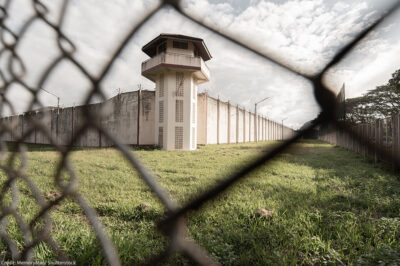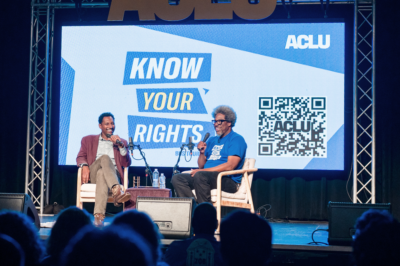Lawsuit Challenges Unequal Response to Mental Health Emergencies in Washington, DC
WASHINGTON — Bread for the City, a D.C.-based nonprofit supporting underserved communities, filed a federal lawsuit today challenging the District of Columbia’s practice of sending police officers rather than mental health providers to respond to mental health emergencies. Represented by the American Civil Liberties Union, ACLU of D.C., and the law firm of Sheppard Mullin, the community organization alleges that the disparity in how the District responds to physical and mental health emergencies violates the Americans with Disabilities Act and the Rehabilitation Act.
“Someone who calls 911 for a physical health emergency gets trained medical providers who can treat and stabilize them. But someone who calls 911 for a mental health emergency gets a police officer with handcuffs and a gun,” said Susan Mizner, director of the ACLU’s Disability Rights Program. “More than just illogical and dangerous, D.C.’s emergency response system fails to provide the same level of care for people in mental health crises as for people in physical health crises. This is precisely the type of unequal treatment our disability rights laws are designed to protect against.”
The lawsuit contends that the District discriminates against people with mental health disabilities by failing to ensure that mental health providers, instead of police officers, are available to provide timely responses to mental health emergencies. Metropolitan Police Department officers’ “training and record of performance establishes that their presence [at a mental health emergency] creates a substantial risk that they will provide ineffective services and, instead, unnecessarily exacerbate the psychological trauma experienced by the person in crisis,” the complaint reads.
“The most effective response to a mental health crisis is to provide empathy, support, and a calm, safe environment. Although the District employs some mental health providers to respond to crises, it has not invested the resources needed or provided them the support necessary to be effective and widely deployed,” said Tracy Knight with Bread for the City.
National and local experts, including the federal Substance Abuse and Mental Health Services Administration and National Alliance on Mental Illness, have concluded that the reliance on police to address mental health crises is more likely to exacerbate than alleviate the mental health issue for which help is sought, and accordingly recommend that communities invest in mental health providers to handle such emergencies.
In Washington, D.C., during FY 2022, less than 1 percent of 911 calls classified as mental health emergencies got a response from mental health clinicians and certified peer support specialists on a Community Response Team (CRT). In contrast, in FY 2022, 90 percent of 911 calls related to physical health emergencies got a response from an EMT or paramedic. Similarly, while D.C. has hired 1,600 EMTs, it has only 44 CRT staff. This understaffing has resulted in response times for CRTs ranging from one to three hours, compared to a benchmark of just five minutes for EMT response or nine minutes for paramedic response.
This lawsuit echoes the concerns raised by the D.C. Crisis Response Coalition, whose policy platform provides recommendations to overhaul the District's response to people experiencing mental health crises.
The following statements can be attributed as noted:
Michael Perloff, staff attorney at ACLU-D.C.:
“If I had a heart attack, I would want someone to call a trained medic, not a police officer. In the same way, if I had a mental health crisis, I would want a mental health provider to provide appropriate care. But that’s not what happens with mental health emergencies in the District of Columbia. Long wait times, a lack of mental health providers, and a police-first response puts people with mental health disabilities in the District at unacceptable risk. The District can and must do better.”
Ashika Verriest, senior staff attorney, ACLU Criminal Law Reform Project:
“Police are not the right people to respond to someone experiencing a mental health crisis, and we should stop expecting them to be. As a matter of safety and equality, D.C. and communities across the country must invest in robust and appropriate crisis response, so that all our neighbors get the proper care they need.”
Dan Brown, partner at Sheppard Mullin:
“Experts agree that someone experiencing a mental health crisis must be able to call a mental health provider who can help. It’s now time for our communities to do the right thing for residents experiencing mental health crises, and we are proud to partner with the ACLU to advance this important cause.”
Bread for the City v. District of Columbia was filed in the U.S. District Court for the District of Columbia.
The complaint can be found here: https://www.aclu.org/documents/bread-for-the-city-v-district-of-columbia-complaint




